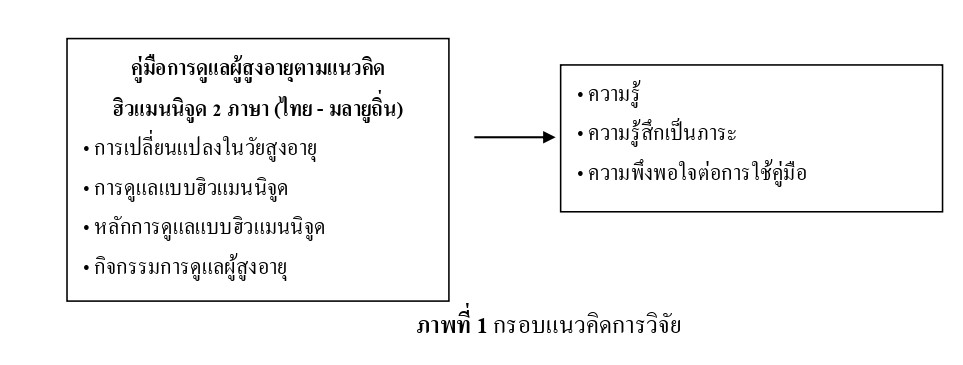Effects of Using the Bilingual (Thai-Malayu) Humanitude Caring Concept in Older Adults on Knowledge, Caregiver Burden, and Satisfaction of Family Caregiver of Older adults in Muang City, Narathiwas Province
Supavadee Adisaisakda
Keywords:
The bilingual (Thai-Malayu) humanitude caring concept in older adults, Knowledge Sharing, Caregiver burden, Satisfaction, Caregiver of older adultsAbstract
The one-group pretest- posttest quasi-experimental study aimed to 1) determine the level of knowledge, caregiver burden, and satisfaction of family caregivers in Muang City, Narathiwas Province, before and after using the bilingual (Thai-Malayu) humanitude caring concept in older adults, and 2) compare the average score of knowledge, and caregiver burden of family caregiver of older adults before and after using the program. The samples of this study were 30 family caregivers of older adults in Muang City, Narathiwas Province. Data was gathered twice: once before and once after using the program for a week. The instruments of this study were demographic data, knowledge measurement, caregiver burden measurement, satisfaction measurement, and manual of caring for older adults. The reliability of instruments were .89, .99, and .89, respectively. Data was analysed by using descriptive statistics and Pair t-test. The results found that the family caregiver of older adults had considerably enhanced of knowledge after using the bilingual (Thai-Malayu) humanitude caring concept in older adults (t=15.05, p<.05). After utilizing the program, caregiver burden of family caregiver of older adults was significantly reduced (t=9.735, p<.05), and the average score of satisfaction with the program was at the high level (X=4.17, S.D.= 0.55).
The results indicate that the bilingual (Thai-Malayu) humanitude caring concept in older adults is effective. The related organization can produce and develop programs to be accessible and easily to understand by using local language to enhance the knowledge of family caregiver of older adults and reduce the caregiver burden. In addition, older adults can receive the appropriate care.
References
Boonvas, K., Supanunt, T., Chunhabordee, A., & Wae, N. (2021). Caregiver stress and needs in caring disabled. The Southern College Network Journal of Nursing and Public Health, 4(1), 207 - 208.
Erdfelder, E., Faul, F., & Buchner, M. (2007). Statistical power analyses using G*Power 3.1: Tests for correlation and regressionanalyses. Behavior Research Methods, 41(4), 1149 - 1160.
Foundation of Thai Gerontology Research and Mental institute. (2021). Situation of the thai elderly. Institute for Population and Social Research, Mahidol University. 120 - 122.
Foundation of Thai Gerontology Research and Mental institute. (2023). Situation of the thai elderly. Institute for Population and Social Research, Mahidol University. 137 - 147.
Gineste, Y., & Marescotti, J. (2008). Humanitude: comprendre la vieillesse, prendre soin deshom mes vieux: A. Colin.
Honda, M., Mori, M., Hayashi, S., Moriya, K., Marescotti, R., & Gineste, Y. (2013). The effectiveness of french origin dementia care method; humanitude to acute care hospitals in Japan. European Geriatric Medicine, 2(4), 207 - 216.
Ito, M., & Honda, M. (2015). Improvement of behavioral and psychological symptoms of dementia (BPSD) by comprehensive standardized care methodology. Austin Journal Clinical Neurology, 2(9), 1 - 2.
Likert, R. (1967). “The Method of Constructing and Attitude Scale”, Reading in attitude theory and measurement. P.90 - 95. Fishbeic, Matin, Ed. New York: Wiley & Son.
Lumsan, S., & Kespichayawattana, J. (2022). The effect of promotion humanitude care program on caregiving stress of caregivers in Ban bang khae social welfare development center for older persons. (Master of Nursing Science, Gerontological nursing). Faculty of Nursing, Chulalongkorn University, Bangkok, Pathumwan. (in Thai).
Melo, R., Pereira, A., Fernandes, E., Freitas, N., & Melo, A. (2017). Prevention of skin tears in the dependent older person: contribuition of the humanitude care methodology. Millenium, 2(3), 45 - 51.
Preamthong, S., & Kespichayawattana, J. (2018). The effect of using humanitude concept by family caregivers care on depression in older persons with stroke. Journal of The Royal Thai Army Nurses, 19(1), 221 - 230.
Puthiwatanatharadol, T., & Kespichayawattana, J. (2017). The effect of humanitude care by caregiver on agitation behaviors of older people with dementia. (Master of Nursing Science, Geronto logical nursing). Faculty of Nursing, Chulalongkorn University, Bangkok, Pathumwan. (in Thai).
Srihaklang, P., & Sasat, S. (2016). The effect of caregiving skill development and caregiver support group program on stress in caregiver older persons with terminal stage cancer. Journal of The Police Nurses, 8(1), 1 - 10.
Sumcharoen, C. (2021). Factors predicting family caregiver's strain from care activities for bed-bound older adults at home. The Journal of Thailand and Midwifery Nursing Council, 36(1), 150 - 166.
Toonsiri, C., Sunsern, R., & Lawang, W. (2011). Development of the burden interview for caregivers of patients with chronic illness. Journal of Nursing and Education, 4(1), 63 - 75.
Zarit, S.H. (1990). Relatives of the impaired elderly: correlated of feelings of burden. Journal of Gerontologist, 20(6), 649 - 55.

Downloads
Published
How to Cite
Issue
Section
License
Copyright (c) 2023 Princess of Naradhiwas University Journal

This work is licensed under a Creative Commons Attribution-NonCommercial-NoDerivatives 4.0 International License.



